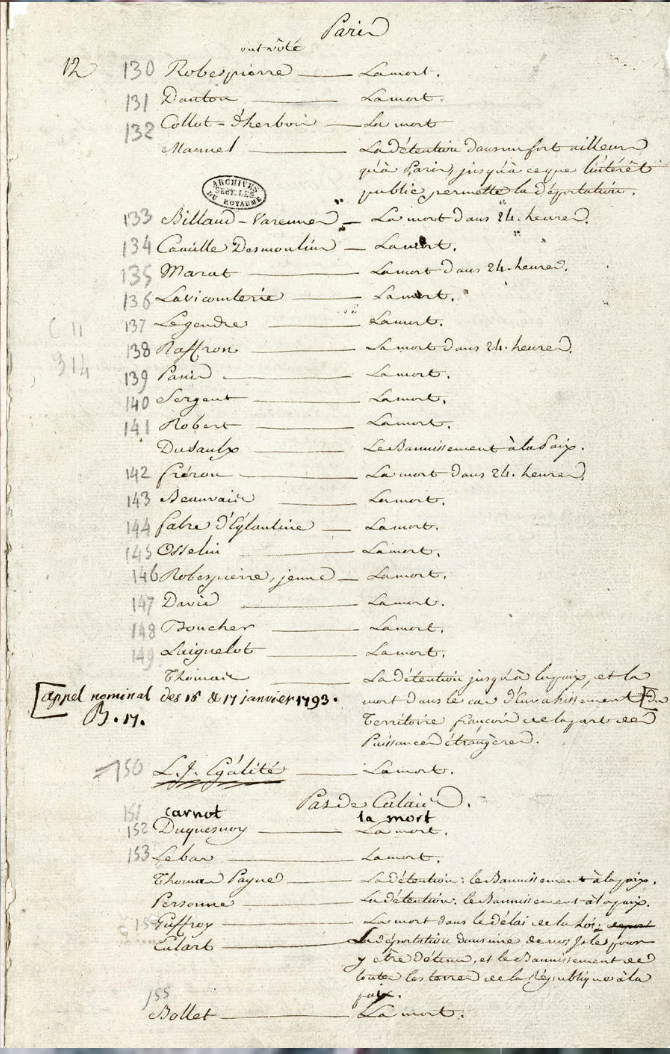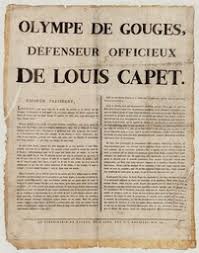|
On 15 January 1793, Louis Capet, previously King of France, is found guilty by an overwhelming majority of the 749 deputies. Two days later, the deputies are asked to vote for a penalty. 346 vote for the death penalty. Others, including Thomas Paine, who had been offered honorary French citizenship, vote for exile, or for imprisonement. . One citizen, who had not voted, argued against the death penalty. Olympe de Gouges started by offering herself as Louis’s unofficial advocate on 16 December, arguing at first that while as a King, he had done harm to the people of France by his very existence, once Royalty had been abolished, he was no longer guilty. As king, I believe Louis to be in the wrong, but take away this proscribed title and he ceases to be guilty, in the eyes of the republic. This proposal, written as a letter to the Convention, was then printed as a placard and distributed throughout Paris. The Convention disregarded the letter. Sèze was made Louis’ advocate, and the argument that Gouges put forward was not taken into consideraton. Louis Capet, stripped of his title, was still tried for high treason, i.e. for actions he had performed while he was still King of France. Olympe did not stop at this. On 18 January, after the King had been found guilty, but before his death had been voted, she put up another placard addressed to the Convention and to the people of Paris, entitled “Decree of Death against Louis Capet, presented by Olympe de Gouges.” In this piece she also attempted to dispel the mistaken impression that she was in fact a royalist. Louis dead will still enslave the Universe. Louis alive will break the chains of the Universe by smashing the sceptres of his equals. If they resist? Well! Let a noble despair immortalize us. It has been said, with reason, that our situation is neither like that of the English nor the Romans. I have a great example to offer posterity; here it is: Louis' son is innocent, but he could be a pretender to the crown and I would like to deny him all pretension. Therefore I would like Louis, his wife, his children and all his family to be chained in a carriage and driven into the heart of our armies, between the enemy fire and our own artillery. (http://www.olympedegouges.eu/decree_of_death.php) Here Gouges is appealing to a well-known fact about the workings of royalism: a King cannot die. The holder of the title may die, but the title passes automatically to the next contender, without, even, the necessity of sacrament. The immortality of the king was such an important precept that a Chancelier, when a monarch died, could not wear mourning. Bossuet captured the phenomenon thus in his Mirror for Kings: Letting Louis live, she would go on to argue in her final published piece, 'Les trois urnes'. would have made it clear that he was no longer a threat to the republic - as no one individual is. To execute him is both to betray a certain lack of confidence in whether the people have truly succeeded in aboloshing the monarchy, and perpetuate that doubt, as after Louis's death, his title is transferred to his descendent.
0 Comments
Leave a Reply. |
About
This is where I live blog about my new book project, an intellectual biography of three French Revolutionary women philosophers. Categories
All
Archives
November 2022
|



 RSS Feed
RSS Feed